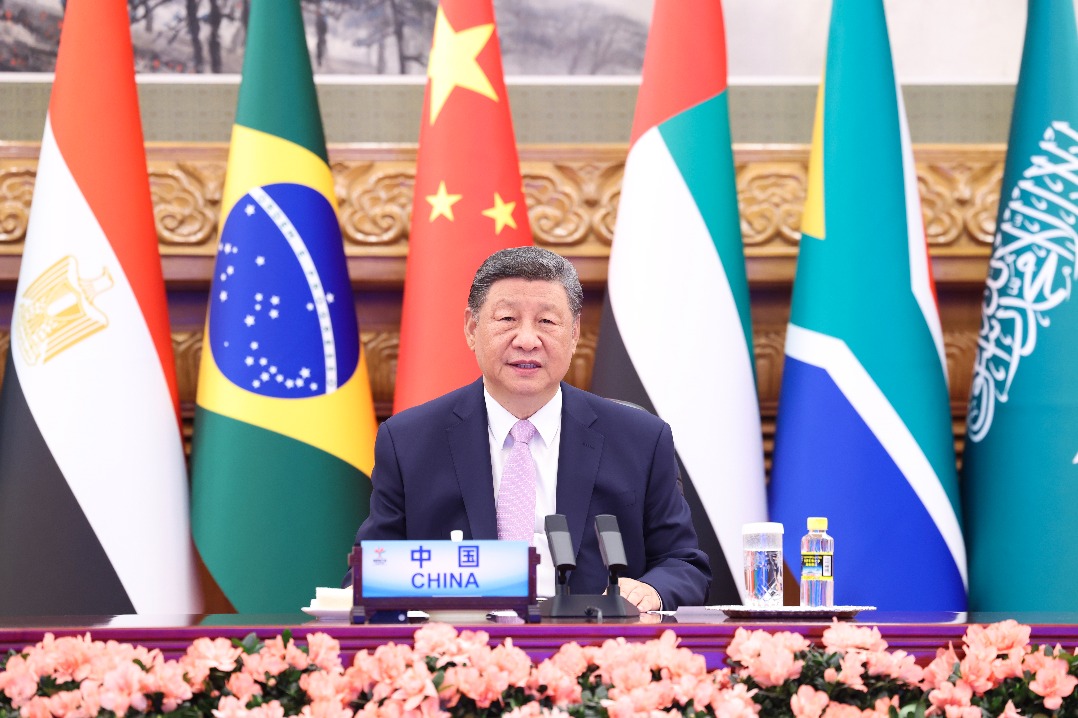Consumption bottleneck

Strengthening and unleashing spending potential of middle and low income families is the key to boosting domestic demand

The COVID-19 pandemic has dealt a heavy blow to household consumption around the world. In China, where the novel coronavirus has been generally controlled, although the consumption of better-off groups has rebounded rapidly, people with less income are still reluctant to spend.
The high and upper-middle income groups have registered relatively fast growth in consumption expenditure on healthcare, telecommunication equipment, jewelry products and so on, alongside reduced expenditure on dining and travel. The low and lower-middle income groups, however, have recorded negative growth in almost all consumption categories, with sharp declines in the consumption of jewelry, automobiles, furniture, and cultural and office goods. Their Engel's coefficient-the proportion of money spent on food in household expenses-h(huán)as rebounded since the outbreak of the pandemic.
Moreover, the middle and low income groups recorded a sharper decline in the consumption of services. The consumption of services by the high, upper-middle, middle, lower-middle and low income groups accounted for 64.5 percent, 37.5 percent, 37 percent, 36.7 percent and 31 percent, respectively, of their total consumption. In the face of the pandemic, the latter four groups' service consumption's share in total consumption declined by 10.7 percentage points, 1.4 percentage points, 3 percentage points and 4.8 percentage points, respectively, while that of the high-income group increased by 2.2 percentage points.
The lower income population has also downgraded their brand choices amid the pandemic. According to transaction data from Tmall.com, the low income group has spent much less on high-end brands of cosmetics, baijiu (distilled Chinese liquor) and bags since the outbreak of the pandemic; and the lower-middle income group has also spent less on high-end cosmetics and bags. In contrast, the upper-middle income and high income groups have demonstrated their continuous preference for higher-end brands as their overseas travel and consumption were blocked by the pandemic and the saved money was used for domestic service consumption and high-end brand consumption.
People with lower income spent less because of their shrinking incomes. The pandemic has further expanded the wealth gap, dealing a heavier blow to low-paid jobs, such as those in the catering industry and the hotel industry, further exacerbating the income inequality in China. According to surveys on household incomes and wealth, in the first nine months of 2020, those with annual household incomes of less than 50,000 yuan ($7,686) reported a sharp income drop amid the pandemic, only 69.5 percent of the previous level; those with annual household incomes of between 50,000 to 100,000 yuan witnessed a slight decline in income, 94.8 percent of the previous level; those with annual household incomes of over 300,000 yuan registered income growth; those with annual household incomes of over 1 million yuan enjoyed relatively fast income growth amid the pandemic.
A fall in consumption expenditure by the wealthier groups is mainly caused by pandemic-induced restrictions, rather than shrinking incomes. According to surveys on household incomes and wealth, the upper-middle income households were less affected financially by the pandemic and their incomes have already returned to the previous level. Their reduced consumption was mostly on services and dining due to pandemic-induced restrictions. Their goods consumption rapidly returned to the previous level with continuous preference for higher-end brands. The middle income group reported the sharpest decline in consumption.
The key to stabilizing consumption lies in stabilizing employment and residential income to restore spending power. The government should keep the income growth of the low income group, which was hit hardest by the pandemic, within a reasonable range by improving the policies for the new forms of employment, such as the food delivery and couriers, online car-hailing and livestreaming e-commerce. In the meantime, the government should attach great significance to the hiring difficulties in the manufacturing sector by improving the flexible employment mechanisms to promote employment of the key groups and help them restore their incomes.
China should improve the COVID-19 prevention and control measures in a timely manner to tap the service consumption potential of the upper-middle income and high income groups. The country should optimize its regular prevention and control measures and restore normalcy in the service industry to fully unleash the pent-up demand with effective prevention and control measures.
The domestic consumption environment should be improved to channel overseas consumption back to the country. The quality of domestic goods and services should be enhanced to satisfy the ever-increasing demand for higher-quality products and services. A multi-layer supply system should be built to provide customized, supreme quality products for higher income groups as well as reasonably priced fine products for lower income groups.
More targeted pandemic relief measures should be rolled out to help the lower income groups. A joint working mechanism should be built to coordinate communities, banks and tax administrations to identify those in need and the government should give them preferential treatment in employment, establish relief funds, guarantee them minimum living and give out subsidies such as e-vouchers.
The inclusive loans for personal consumption should be further promoted to improve the lower-income population's access to financing. The lower income population's employment, income and disposable cash flow was hit hard by the pandemic, creating more demand for loans for personal consumption.
However, they have difficulties in getting access to such loans. Therefore, China should further promote inclusive financial services and make credit policies better targeted to help the truly needy, such as China's lower-tier markets and the lower income population. The cooperation between financial institutions and the internet companies should be encouraged to reach and serve customers in the lower-tier markets.
Li Chengjian is an associate research fellow with the Department of Macroeconomic Research at the Development Research Center of the State Council. Chen Changsheng is a senior research fellow and director-general of the Department of Macroeconomic Research at the Development Research Center of the State Council. The authors contributed this article to China Watch, a think tank powered by China Daily. The views do not necessarily reflect those of China Daily.
The opinions expressed here are those of the writer and do not necessarily represent the views of China Daily and China Daily website.
If you have a specific expertise and would like to contribute to China Daily, please contact us at opinion@chinadaily.com.cn, and comment@chinadaily.com.cn.

































